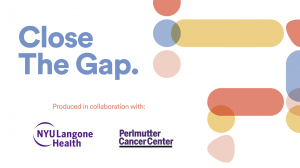Genes & Biology Drive Racial Disparities in Breast Cancer
- Women of African ancestry are likely to carry a gene that raises their risk for aggressive, triple-negative breast cancer.
- Triple-negative tumors in African American women are biologically different from those in white women.
- Researchers don’t know as much about cancer-related genes that might be common in women of African ancestry.
Read More"Because the biology of these tumors might be more aggressive, it's more likely that the cancer can get to a later stage before diagnosis, even in women who get their mammograms regularly” Dr. Oke
Breast Cancer Before 40 is Deadlier
Women who get breast cancer before they turn 40 have poorer survival rates than women who develop breast cancer later. African American women are more likely to develop the disease at this young age. Research is underway to better understand why African American women run a higher risk of developing breast cancer before the age of 40.
Related: Getting to Know Your Breasts with Self-Exams
The age when puberty begins and age at a girl's first period can play a part in breast cancer risk and age at diagnosis. Genetics seems to drive early-onset cancers, too.
"When breast cancer occurs before age 40, it tends to point to a genetic predisposition for the condition," Melissa B. Davis, PhD, Scientific Director of the International Center for the Study of Breast Cancer Subtypes, Weill Cornell Medical College, tells SurvivorNet.
A Genetic Predisposition for More Aggressive Disease
Women of African ancestry, whether they are American or not, are more likely to get triple negative-breast cancer than women of other races and ethnicities. This is the hardest breast cancer to treat. There are fewer treatment options for this type of cancer. These tumors can also be more aggressive than other types and frequently become resistant to chemotherapy.
Dr. Kathie-Ann Joseph describes genes that raise risk for triple-negative breast cancer.
"Because the biology of these tumors might be more aggressive, it's more likely that the cancer can get to a later stage before diagnosis, even in women who get their mammograms regularly," Oluchi Oke, MD, tells SurvivorNet. She is a breast medical oncologist at MD Anderson Cancer Center in Houston, TX.
Genes likely play a role in who's most likely to get this more aggressive type of breast cancer. Researchers at Weill Cornell Medicine, led by Davis, found that people whose breast tumors have higher levels of an immune-related gene called DARC/ACKR1 live longer after their breast cancer diagnosis. The gene, when present in breast tumors, slows the cancer's growth and spread. But, a gene mutation that is extremely common in women of sub-Saharan West African ancestry seems to lead to lower levels of DARC/ACKR1 in tumor tissue, which allows the tumors to grow and spread quickly. Women of African ancestry who have this mutation have a greater risk for triple negative breast cancer.
Different Tumor Biology
Not only are women of African ancestry more likely to get the more aggressive triple-negative breast cancer, but triple-negative breast tumors in African American women may be quite different from those that develop in white women. This could explain why, even when comparing women who all have triple-negative disease, African American women still tend to do worse than other women.
Related: Minorities Are Missing Out on Lifesaving Clinical Trials and Cancer Care: 4 Ways to Fix It
A recent study compared the makeup of triple-negative breast tumors in white women to those of African American. The results showed that other cells that make up a tumor non-cancerous cells that form the tumor immune microenvironment are very different in triple-negative breast tumors of African American women and white women.
The tumor immune microenvironment can influence how a tumor responds to treatment and how the tumor grows and spreads. So, these differences could contribute to the different survival rates.
Lack of Genetic Information About African American Women
African American women may not have access to as much information about their genetic risk for breast cancer as white women do. That's because the large genetic studies that identify risk genes, such as BRCA1/2, are made up mostly of women of European ancestry. Researchers know a lot less about risk-related genes that may be common in women of African ancestry.
Related: Study Says Clinical Trials Lack Diversity, Still Help Get FDA Approval for Cancer Drugs
"For people who are not of European descent, genetic tests could find mutations in cancer genes, but we may not have enough information about the mutation's relationship to cancer risk," Davis says. These types of gene mutations are called variants of unknown significance.
With the right information about her unique genetic risk for breast cancer, a woman may go for more frequent screenings, get screening earlier, or even have preventive surgery. Without this information, many women may not be getting the best and most appropriate preventive care for them.
Importance Of Clinical Trials
In order for researchers to learn more about risk-related genes common in women of African ancestry, they need to enroll more African American women in clinical trials. Hospitals that run clinical trials may do a poor job of enrolling a diverse mix of women, and African American women may be less likely to agree to participate.
"Part of that has to do with a long history of mistrust of clinical trials in the African American community based on a history of unethical clinical trials that were conducted in African American people," Oke says. "And they don't necessarily have updated information about the stringent protocols that clinical trials now must follow in order to be ethical."
Related: How Can African American Communities Trust Clinical Trials During the Coronavirus Pandemic?
But on the flip side, she adds, doctors may be less likely to ask African American patients to join clinical trials because they assume the answer will be no. "Don't wait for your doctor to offer you a clinical trial. Ask." That advice may be especially important for African American women who have run out of treatment options. Sometimes, it's necessary to enroll in a clinical trial to have access to treatments that you haven't already tried.
African American women could help researchers and doctors understand what makes breast cancer so different for them, and how to improve treatments, by volunteering for clinical trials.
"There's still a gap in knowledge for certain subpopulations depending on your genetic ancestry and we are still trying to work that out," Davis says. "What we're working on is trying to increase the representation of non-European people in genetic studies so we can learn what these genes mean."
Close the Gap
Disparities in treatment and survival rates for African American cancer patients are a grim fact of life in the U.S. However, over the past two years, SurvivorNet has focused on raising awareness around this persistent racial gap. The "Close the Gap" initiative is working to improve survival rates for all people diagnosed with cancer regardless of race. We are pleased to have NYU Langone and The Perlmutter Cancer Center as partners in this effort, as the fight for equality carries on.
The "Close the Gap" initiative is working to improve survival rates for all people diagnosed with cancer regardless of race. We are pleased to have NYU Langone and The Perlmutter Cancer Center as partners in this effort, as the fight for equality carries on.
Learn more about SurvivorNet's rigorous medical review process.


